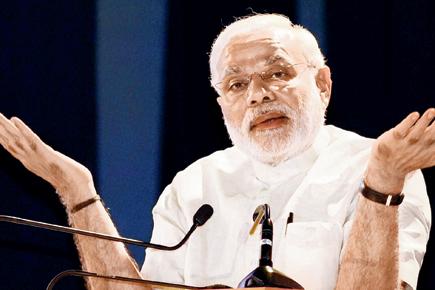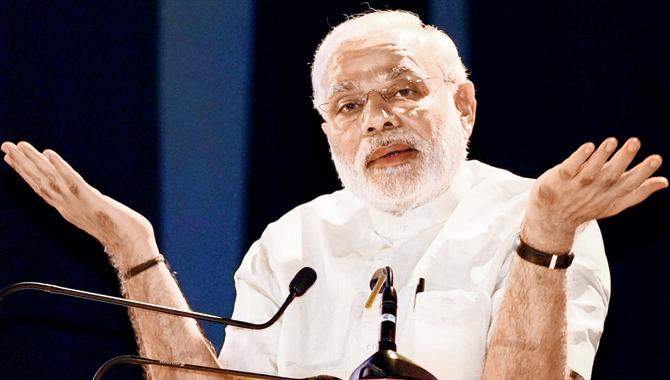In politics, depending on your point of view, one year can be a long, or a short time

Narendra Modi
 In politics, depending on your point of view, one year can be a long, or a short time. The Narendra Modi government has hit that anniversary and while critics charge that he has failed to deliver, his supporters argue that a year is simply too short a time to judge the government of a country as huge as India, and one with legacy issues ranging from corruption to misgovernance.
In politics, depending on your point of view, one year can be a long, or a short time. The Narendra Modi government has hit that anniversary and while critics charge that he has failed to deliver, his supporters argue that a year is simply too short a time to judge the government of a country as huge as India, and one with legacy issues ranging from corruption to misgovernance.
ADVERTISEMENT
Modi's arrival was spectacular, at the head of the first party to win a majority by itself since 1989. His burden has arisen not only from expectations he aroused as a prime ministerial candidate, but also from the fact that he has a majority in Parliament, the first PM to have one since 1989. In other words, people believe that he is in a position to change things in a way Manmohan Singh, Vajpayee and his other predecessors of the 1990s were not.
The economic story of Modi's first year in office is mixed, both in the economic and political fronts. GDP has picked up to 7.4 per cent in 2014-2015, after a change in the way it was calculated. The index of industrial production for eight core sectors — coal, crude oil, natural gas, refinery products, fertiliser, steel, cement and electricity — grew 5 per cent in 2014-15 over 4.2 in the previous year. However, areas of concern remain such as declining exports and imports, which went down 2 and 0.5 per cent in 2014-15 over the previous year.

Modi himself is on record saying that it would take him 5-7 years to fulfil his agenda. The issue, however, is not how much time he deserves, but how much he will actually get, and no one can forecast that. Pic/PTI
Of greater concern has been the continued poor performance of the agriculture sector where 600 million Indians are employed. It grew a marginal 1.1. per cent in 2014-15 and experts say that the numbers point to a deepening crisis in this sector.
Corporates and investors were betting on big bang reforms to kick-start growth and FDI has grown over 37 per cent in the past year. As the experience of tax laws imbroglio suggests, reform is not easy. However, the stock market continues to repose faith in Modi, though in the recent past, tax issues have dampened the spirits of foreign institutional investors.
The global fall in crude oil prices came as an unanticipated boon for the new government, as they helped in trimming the import bill and saving foreign exchange. There was good news as well in the inflation front, particularly in consumer prices which are below the Reserve Bank of India's 6 per cent target. However, the fiscal deficit has been contained to a comfortable figure.
On the political front, Modi has not been troubled so much by the shell-shocked Congress party, but elements in the Sangh Parivar who believe that the 2014 victory was a vindication of their politics. Perhaps they are worried that if allowed to go his own way, Modi could run away with the development agenda, and leave them high and dry. So they continue to agitate to push their Hindutva agenda wherever they can, queering the pitch for the BJP and the Modi government.
So far the prime minister has played a canny game. As the Gujarat experience of 2002 revealed, Modi is a skilful and cynical politician, who will not hesitate to use the communal agenda for electoral gain, just as a generation of politicians, from Indira Gandhi, Lalu and Mulayam Singh Yadav have done. Modi has not directly spoken on the issues of alleged attacks on churches or the communal violence in UP, or the inflammatory statements of some so-called sadhus and sants. But he has worked behind the scenes to rein them in because he is fully aware of their potential of derailing his agenda.
He has sought to position himself as a social reformer, keen to push the agenda of “sabka saath, sabka vikas” and promote programmes like “Swachh Bharat” and “Namami Ganga” and for women's empowerment. However, from the public point of view, the most important agenda is neither social, nor cultural, but his promise to rejuvenate India's economy and make it an industrial power. And this is where there are growing doubts about the ability of his government to do things.
There are issues like the land acquisition bill which have generated a lot of opposition. But that is par for the course for anyone trying to change the way the country is being run. He will, no doubt, face even bigger hurdles when he tries to reform the labour laws of the country, considering that biggest trade union in the country, the Bharatiya Mazdoor Sangh is affiliated to the BJP.
The problem seems to be an acute lack of expertise in the system. Modi is wary of his own political colleagues and is hoping that the bureaucracy will do the needful, just as it had done in Gujarat. But, the problem is that debris of a decade of misgovernance and corruption has paralysed the government machinery.
In the old days, a new minister took office things ran on their own. Today, each ministry requires deep restructuring and reform for it to even function effectively. The only people who can lead change are politicians, not bureaucrats. Unfortunately for the party, with stalwarts like Arun Shourie, Yashwant Sinha, BC Khanduri and Murli Manohar Joshi sidelined, the party has a very narrow base of experienced leaders who can lead the process. Mr Modi relies on Arun Jaitley, who is known for his abilities, yet, he simply cannot overhaul a dozen ministries.
Modi himself is on record saying that it would take him 5-7 years to fulfil his agenda. That is a reasonable amount of time. The issue, however, is not how much time he deserves, but how much he will actually get, and no one can forecast that.
The writer is a Distinguished Fellow, Observer Research Foundation, New Delhi
 Subscribe today by clicking the link and stay updated with the latest news!" Click here!
Subscribe today by clicking the link and stay updated with the latest news!" Click here!






